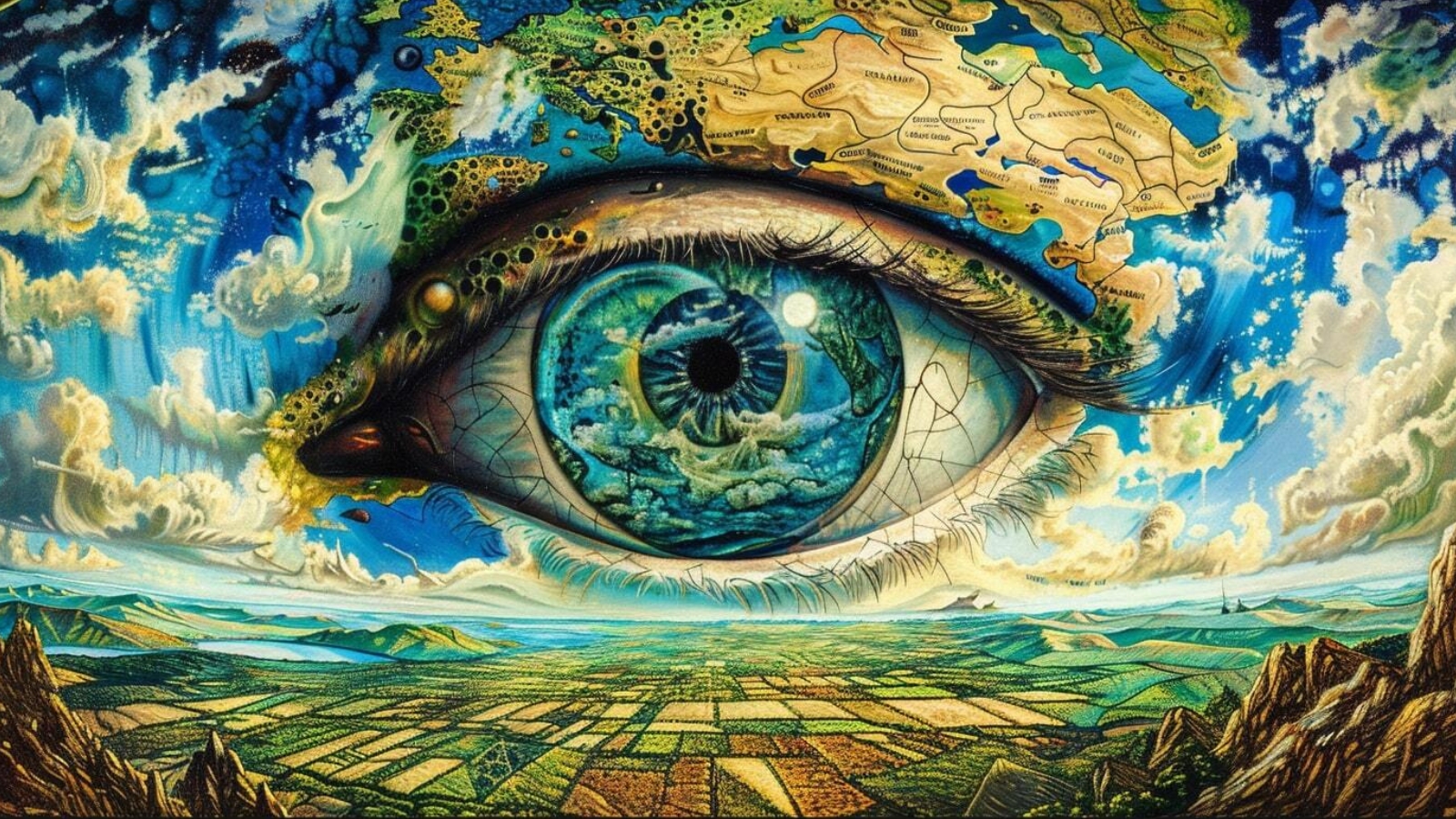A groundbreaking new scientific article proposes a bold idea: humans may be unwittingly transforming Earth into a planet with a form of “planetary intelligence.” The researchers argue that the collective activity of life, and now human technology, could be causing the Earth to take on characteristics of a gigantic, self-regulating complex system that, in some ways, resembles a mind.
When we think about intelligence, we usually picture individual creatures like humans or animals. But could intelligence emerge on a much vaster scale—could an entire planet somehow “think” and process information? A trio of researchers—Adam Frank, David Grinspoon, and Sara Walker—explore this provocative question in a new paper titled “Intelligence as a planetary scale process.”
They propose that the Earth itself may be developing a kind of global intelligence, as the rapidly growing “technosphere” of human technology increasingly links into and controls crucial planetary systems.

Understanding Intelligence on a Planetary Scale
The traditional view of intelligence in astrobiology focuses on individual species—an intelligent species evolves on a planet, and may eventually develop a technological civilization. However, the researchers argue we need to expand our thinking.
They propose several key characteristics a planet would need to display to be considered “intelligent” in a meaningful sense:
- Emergence: Planet-scale intelligence would be an emergent property arising from complex interactions between parts to create planet-wide effects and behaviors. The whole would be more than the sum of its parts.
- Information Networks: Global networks would arise that process meaningful information, not just shuttle data around. There would be feedback loops where the state of the network affects the parts.
- Adaptive Complexity: The planetary system would become a complex adaptive system, changing its behavior in response to changes and in ways that tend to maintain stability.
- Self-Sustaining: Like a living organism, the system would work to maintain itself in a relatively steady, self-sustaining state.
From this broader view, the researchers trace Earth’s potential past and future development of planetary intelligence through several key stages.
The Immature & Mature Biosphere
The researchers argue that even before humans arose, Earth’s biosphere—the global system of all life on the planet—may have displayed some of the hallmarks of planetary intelligence in a nascent form. Ancient microbial life caused profound changes in Earth’s atmosphere, like the Great Oxygenation Event 2.4 billion years ago.
These changes then fed back on life, enabling new forms of oxygen-using biology and more complex ecosystems. In this way, the researchers argue the ancient biosphere “recognized” planetary states like global chemical balances and collectively responded in ways that altered those states, making the planet more stable and favorable for life in the long run. This could be seen as a very simple form of global information processing and adaptive behavior.
As life evolved and the biosphere became more complex and interconnected over billions of years, this proto-intelligence developed further. The researchers point to Gaia Theory, which proposes that life acts to self-regulate the planet in a kind of homeostasis. Networks in the biosphere may recognize disruptions and instabilities and unleash cascading effects in response that act to bring the planet back into balance—a crude kind of planetary self-preservation instinct.
So, in this view, the “mature biosphere” that exists today may already display some of the attributes of a very basic planetary intelligence—albeit one that operates on geologic timescales.
The Immature Technosphere
Fast forward to the modern day, and a new force is driving rapid planetary changes: human technology. The sum total of human technology and its myriad impacts is sometimes called the “technosphere.” By burning fossil fuels, transforming ecosystems, and more, human technology is exerting profound effects on critical planetary systems—what scientists are calling the “Anthropocene” era.
The researchers argue that, so far, our technosphere is dangerously immature. Like a reckless toddler, it lumbers around carelessly knocking over planetary furniture, causing global upheavals without any real understanding or control of the long-term consequences.
The climate crisis is exhibit A: by dumping greenhouse gasses into the atmosphere haphazardly, our immature technosphere is exerting a strong destabilizing effect on the global climate, perturbing the entire planet into a chaotic new state for which it is not prepared.
Other examples of technosphere immaturity abound: nitrogen run-off disrupting ecosystems, novel chemicals and plastics infiltrating food chains, mass extinctions as habitat loss destabilizes biodiversity. So, while our technosphere is increasingly a dominating planetary presence, so far, it is an unthinking one—disrupting and simplifying planetary systems rather than acting to regulate and enrich them thoughtfully. In short, Earth’s technosphere has not yet achieved any real form of planetary intelligence.

Towards a Mature Earth Technosphere
The big question looking forward, the researchers argue, is whether humans can guide our technosphere towards maturity—a transition from reckless, simplifying disruption to thoughtful, responsive self-regulation. What would a “mature technosphere” entail? Several key attributes to consider.
Recognizing Boundaries
A mature planetarily intelligent technosphere would accurately recognize the boundaries and limits within which it must operate to maintain a stable, life-sustaining planet. Just as a mature biosphere does not pollute the air it breathes, a mature technosphere would not wantonly perturb critical planetary systems into dangerous states.
Responsive Adaptability
Guided by scientific understanding, a mature technosphere would be able to model and predict the global consequences of its actions dynamically. It would respond and self-regulate accordingly to maintain the planet within recognizable boundaries.
Promoting Enrichment and Complexity
Rather than simplifying ecosystems and perturbing natural processes, a mature technosphere would thoughtfully enrich systems and promote productive complexity and diversity. Much as the biosphere over time made the planet more lush and life-sustaining rather than less, a mature technosphere would act to increase the Earth’s biological and experiential richness.
Self-Sustaining Reflexivity
Humans, as part of the technosphere, would see themselves and their technology as part of a reflexive, self-sustaining planetary system rather than something separate. Decisions would be made with an understanding of long-term global impacts; self-preservation of the planetary system would be a built-in motivation.
If the human technosphere were to take on such characteristics, it would represent a true transition to planetary intelligence, the researchers argue—a global, technologically-mediated system that is self-aware in a meaningful sense, able to model itself, respond to perturbations, and self-regulate in complex ways to maintain stability and enrich planetary conditions. In essence, Earth’s technosphere and biosphere would merge into a kind of self-sustaining, cybernetic global entity.
An Inevitable Transition for Technological Species?
The concept of planetary intelligence remains highly speculative and controversial. A planet is not a literal “brain,” and just what it would mean for one to be meaningfully “intelligent” is thorny and debatable. Are simple self-regulation and homeostasis really enough to qualify as intelligence? How do we square a planet “wanting” to maintain itself with the scientific rejection of planetary goals and purpose?
The researchers address these concerns by drawing thought-provoking parallels with other complex systems that display “emergent” higher-order behavior, even though they are not traditional “minds.” Ant colonies, for instance, display complex adaptive behaviors that emerge from simple interactions of individual ants.
A human body regulates itself and heals cuts without the brain micromanaging each cell. In this view, Earth’s biosphere and technosphere could give rise to emergent global behaviors that maintain and shape the planet in profound ways.
Whether or not one fully buys into the planetary intelligence hypothesis, it provides a fascinating framework for thinking about the evolution and long-term future of life and technology on Earth (and other worlds). Other scholars have proposed stages of Earth’s evolution, like the “immature biosphere” giving way to a “mature biosphere.”
The “planetary intelligence” concept takes this further, suggesting that the rapidly developing technosphere represents the germination of a new kind of global planetary organization with new levels of adaptive complexity.

The Role of Humanity in Earth’s Evolution
In an age of looming climate catastrophe and other global-scale crises, the key practical question stands out in stark relief: will humanity continue to be a bull in the china shop of Earth’s complex systems, or can we guide our mighty technosphere to be a responsible steward of the world and ourselves?
In other words, can we transition from a simplifying, destructive, immature technosphere to one that is dynamically responsive, self-aware in its global impact, and self-sustaining? A technosphere that is, in a meaningful sense, globally intelligent? Answering this question, the researchers argue, may very well determine the fate of our species and the long-term future of life on Earth.
A broader implication of this planetary intelligence hypothesis is that it may represent a critical, inevitable evolutionary stage that any technological species must pass through if they are to survive in the long term. The researchers suggest that just as Earth’s biosphere transitioned from simplifying and unstable to complexifying and self-stabilizing, any technological civilization that lasts may have to guide its own “technosphere” through a similar transition.
If this is the case, then the concept of planetary intelligence may offer a compelling new way to think about the evolution and long-term detectability of technological civilizations in the universe. A planet that has successfully “woken up” and stabilized its technosphere may display very different “technosignatures” than an immature, unstable technological world.
By considering planetary evolution through the lens of planetary intelligence, the researchers aim to expand how we think about life, mind, and technology at the grandest scales.















